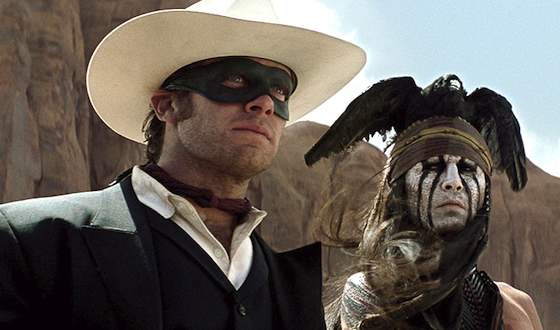- MENU
- HOME
- SEARCH
- WORLD
- MAIN
- AFRICA
- ASIA
- BALKANS
- EUROPE
- LATIN AMERICA
- MIDDLE EAST
- United Kingdom
- United States
- Argentina
- Australia
- Austria
- Benelux
- Brazil
- Canada
- China
- France
- Germany
- Greece
- Hungary
- India
- Indonesia
- Ireland
- Israel
- Italy
- Japan
- Korea
- Mexico
- New Zealand
- Pakistan
- Philippines
- Poland
- Russia
- South Africa
- Spain
- Taiwan
- Turkey
- USA
- BUSINESS
- WEALTH
- STOCKS
- TECH
- HEALTH
- LIFESTYLE
- ENTERTAINMENT
- SPORTS
- RSS
- iHaveNet.com: Movie Reviews

1 Star
Not that Johnny Depp did them for free, but
This time Depp takes on the most famous yet most marginalized sidekick in 20th-century popular culture, the Native American known in his early radio days as "the faithful
How/why/wherefore did it turn out this way?
The evidence suggests a combination of hubris, errant revisionism, a misguided and perverse degree of violence, and a script that never worked in the first place, in the second draft or in any of the rewrites. Is it too late to shut down production on a summer picture that's already in theaters?
The framing device established by that script, credited to Justin Haythe and the team of Ted Elliott and Terry Rossio, promises at least a workable approach. In 1933
Lawman John Reid, the square-jawed, Eastern-educated masked man played by Armie Hammer ("The Social Network," "J. Edgar") is only slightly more comfortable in Verbinski's venal Old West than Bob Hope was in the "Paleface" comedies. But this is no comedy, or rather, the attempts at muttered wisecracks ("What's with the mask?" queries a wise old native chief) and elaborate Buster Keaton-inspired stunt work sit uneasily alongside scarifying attack rabbits or minor characters (such as Stephen Root's railroad man) getting shot in the back and screaming in pain while someone makes a speech. Most egregiously, we have the psychopathic outlaw Butch Cavendish, played by William Fichtner, who doesn't merely shoot and kill Reid's
As in the animated "Rango," which Verbinski also directed, "The Lone Ranger" has ambitions toward a vision of the American West that tells the truth (a version of it, anyway) about the genocidal slaughter, dirty dealings and cynicism-inducing dread involved in the "settling." ("Rango" owed as much to the story line of "Chinatown" as it did to "Cat Ballou.") As the elder Tonto delves into the first flashback, we meet the Lone Ranger and the younger Tonto in the middle of a bank robbery. The movie then lurches on, from one enormous, inert action sequence to another, to answer the question: How did the Lone Ranger become a bank robber, and why?
Faced with a force of evil as bad as Cavendish, and the motivations of those behind the transcontinental railroad (Tom Wilkinson adds a touch of gravity as the empire builder), Reid has no choice but to bury his upright, law-abiding ways and go rogue with his frenemy Tonto. Bonham Carter shows up as a one-legged madam, whose replacement leg perversely hides a double-barreled shotgun. Ruth Wilson plays the widow of Reid's brother, who attracts the attention of Wilkinson's railroad magnate. Barry Pepper cuts a sharp, Custer-like figure as a captain drawn into an
If the movie gets by with audiences, it'll be thanks to the 21st-century novelty of seeing huge, chaotic action set pieces, one early and one a couple of hours later, set aboard spiffy-looking period-accurate locomotives. I'm not sure, though, if Verbinski's fastidious attention to production design means much amid the usual onslaught of computer-generated imagery (buffaloes, rabid attack rabbits). The director has said that he envisioned the Lone Ranger as the James Stewart character from "The Man Who Shot Liberty Valance" being thrown headlong into a Sam Peckinpah splatter-fest. Is this really what we want from a good-time summer picture? Is Depp's minimalist mugging as Tonto fresh enough to warrant good word-of-mouth? Every time the film nods in the direction of the Lone Ranger of old, either the radio version or the television series, it's essentially to dump on it; when we finally hear the "Hi-yo, Silver! Away!" line from Hammer, it's simply to set up a witless put down from Tonto.
I didn't grow up loving "The Lone Ranger," or watching the show, so I have no allegiance to the earlier versions of the mythology. The old condescension toward Tonto was pretty galling. But here, in scenes such as hundreds of Natives being slaughtered by U.S. troops behind Gatling guns, we have Tonto and the Lone Ranger acting like a couple of comic-relief ninnies, screwing around aimlessly for laughs on a handcar. It's as if the movie were having a nervous breakdown. At one point the masked man gets his head dragged through horse manure. Watching "The Lone Ranger," you know the feeling.
MPAA rating: PG-13 (for sequences of intense action and violence, and some suggestive material).
Running time: 2:29.
Cast: Johnny Depp (Tonto); Armie Hammer (The Lone Ranger); Barry Pepper (Fuller), Tom Wilkinson (Latham Cole), William Fichtner (Butch Cavendish).
Credits: Directed by Gore Verbinski; written by Eric Aronson, based on the story by Justin Haythe, Ted Elliott and Terry Rossio; produced by Verbinski and Jerry Bruckheimer. A Walt Disney Studios Motion Pictures release.
Copyright © Tribune Media Services, Inc.
'The Lone Ranger' Movie Review - Johnny Depp and Armie Hammer